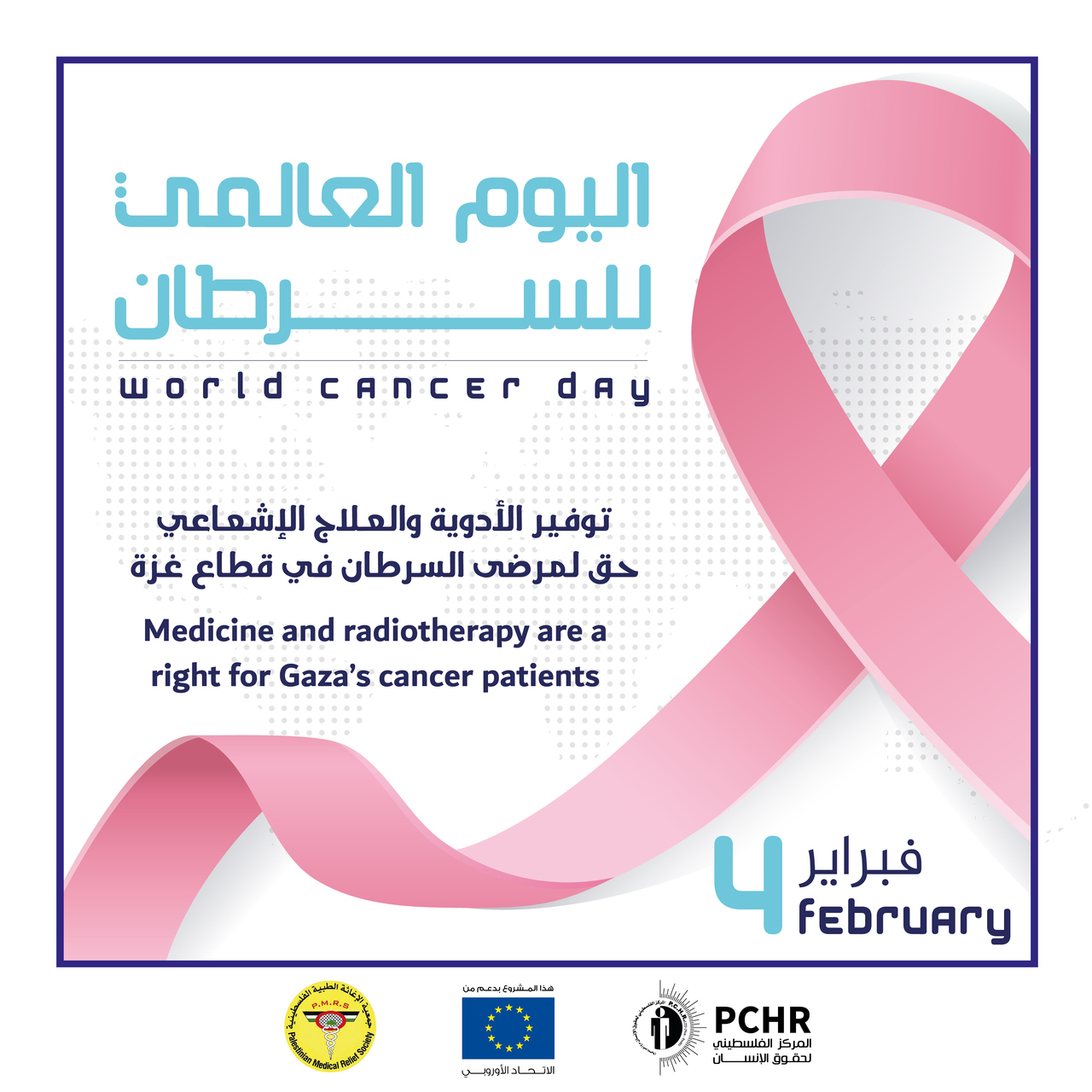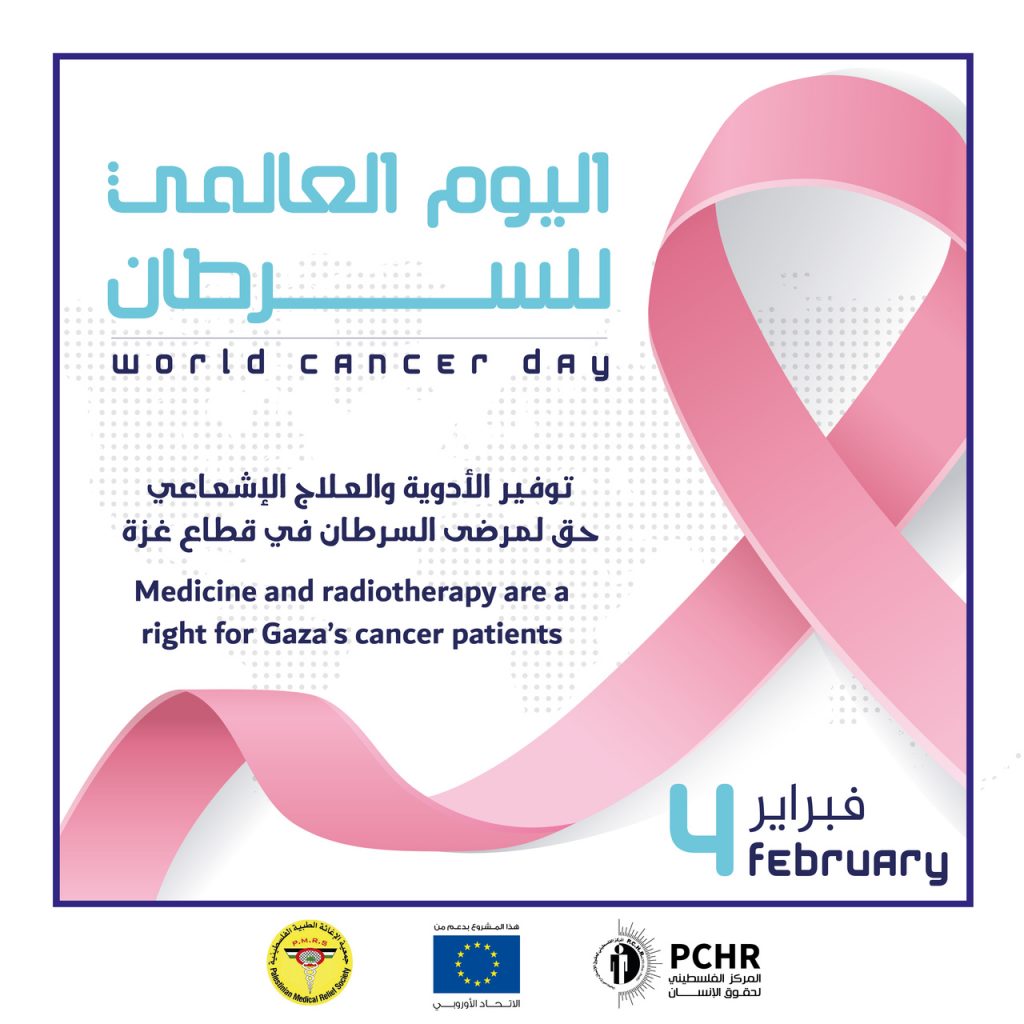

Ref: 16/2021
Date: 4 February 2021
Time: 10:30 GMT
Thursday, 04 February 2021, is the 21st anniversary of World Cancer Day, this day comes upon Gazan cancer patients as they suffer immensely due to restrictions on their freedom of movement and travel for treatment under the strict Israeli-imposed closure, the acute shortage of medicine and medical supplies in Gaza’s hospitals, especially radiotherapy, and the Israeli ban on the entry of new medical devices and laboratory equipment needed to conduct tests for patients. These challenges combined with the deteriorating economic conditions, poverty, and unemployment in the Gaza Strip, deprive cancer patients of receiving treatment and medical services commensurate with their serious health conditions.
There are at least 14,000 cancer patients in the Gaza Strip; 47% male and 53% female. Breast cancer is the most commonly diagnosed cancer among females, constituting 32.2%, while colorectal cancer is the most common type of cancer among males, constituting 13.2%.
The Palestinian Ministry of Health (MoH) is the only provider of treatment for cancer patients in the Gaza Strip hospitals: Gaza European Hospital, Al-Rantisi Children’s Hospital and Al-Hayat Specialist Hospital, noting that the MoH recently contracted al-Hayat Hospital and opened an Oncology Department in April 2020. Despite the shortage of specialized doctors and nurses, medicines, medical supplies, and diagnostic devices, Gaza hospitals provide medical services and treatment for cancer patients to the extent possible.
In general, cancer patients suffer acute shortage of the essential drugs needed for their treatment, with a 50% deficit rate. The most important medicines for cancer patients that are out of stock are: Herceptin, Glivec, Taxol, and Neupogen. Additionally, there is shortage in medical supplies needed for cancer patients’ treatment, with a 40% deficit rate, as devices used in radiotherapy are unavailable in Gaza’s hospitals, in addition to diagnostic devices, including PET CT scan and Thyroid scan.
Due to the constant shortage of medicines and medical supplies, the MoH refers the cancer patients for treatment abroad. However, they were denied access to treatment due to: a. the Israeli closure, the tight restrictions on travel via Beit Hanoun (Erez) Crossing; b. the almost complete closure of Rafah Crossing; c. restrictions imposed due to the outbreak of Coronavirus pandemic since March 2020; and suspending the travel coordination for Gaza’s patients referred for treatment at hospitals in Israel and the West Bank by the coordination and liaison office of the Palestinian Ministry of Health from 19 May to 22
November 2020. This move was pursuant to the Palestinian President’s decision on 20 May 2020, stating that the State of Palestine and the Palestine Liberation Organization (PLO) are no longer bound by treaties and agreements with the American and Israeli governments and all consequent obligations.
As a result, hundreds of critically ill Palestinians whose health conditions cannot afford any delay, were deprived of traveling abroad for treatment or completing the treatment protocols they had previously started. As such the number of patients who were able to travel for treatment witnessed an unprecedented decline, here follows the number of patients who travelled per month from April to November 2020:
| Month | No. of Patients | Month | No. of Patients |
| April 2020 | 110 | August 2020 | 192 |
| May 2020 | 100 | September 2020 | 193 |
| June 2020 | 95 | October 2020 | 319 |
| July 2020 | 138 | November 2020 | 526 |
After the MOH’s Liaison Office resumed its patient coordination program for Gaza patients referred for treatment in West Bank and Israeli hospitals, Israeli authorities continued to hinder their travel as 274 referred patients out of 930 were denied travel (34.9%). Of those, 15 (1.6%) were reused for security reasons; 108 (11.6%) did not receive a reply; 85 (9.1%) delayed response (pending); 15 others (1.6%) were requested to change their companion; and 51 (5.4%) were refused for other reasons.
In light of the above, PCHR: